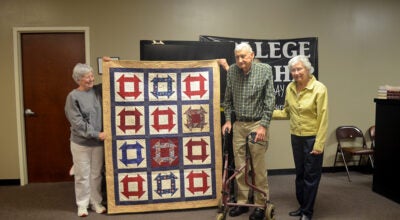Whole new outlook
Published 12:00 am Saturday, October 31, 2009
The first eight miles of the marathon were brutal.
Steep hills, two miles in length, had to be traversed between miles one and three and six and eight. The “climb’ was taxing for Larry Brain Hicks and began to take its toll at about mile 15. Hicks’ legs started to cramp.
Leg cramps are not unusual for a marathon runner but Hicks wasn’t running. He was powering a hand cycle.
“I had gotten dehydrated and that’s what caused my legs to cramp,” Hicks said. “My upper body was in good shape for the marathon. My goal was to finish and it was a great feeling when I finally crossed the finish line.”
The day was Oct. 25, 2009 and it was a red-letter day for Hicks.
Competing in the Marine Corps Marathon in New York was something that he would never have imagined six years ago. But in a quick turn of events on a dusty road in Iraq, Hicks’ life was changed forever.
He had been deployed to Iraq with his Alabama National Guard unit in Mobile. The humvee, Hicks was riding in overturned and his left leg was severely injured.
“There was permanent damage to my leg and, after 12 surgeries, the doctors were running out of bone and tissue,” Hicks said. “The blood flow to my leg was being cut off. At that point, they could take my leg off below the knee. If I waited, hoping to save the leg, I might wind up having to have it taken off above the knee.”
For Hicks, there seemed to be little choice.
“When you lose a leg, that changes every thing that you do, from the basic ways of taking care of yourself to getting up and going to the kitchen to get a drink of water,” he said. “Suddenly, getting dressed in the morning was a big thing for me.”
Hicks had been around long enough to see how others reacted to traumatic situations.
“I’d seen people go in both directions, good and bad,” he said. “I knew that my attitude would determine which direction I took.”
As a member of the military, Hicks had been required to stay in shape so his focus was on getting back to where he had been but without a leg.
“I had to refocus on things and fitness was one of those things,” he said. “I started swimming at the Y in Montgomery and, once I got back to where I was physically, I was determined to see how far I could go.”
In 2007, Hicks got a call from the Achilles Freedom Team in New York, which is a disabled sports group.
“They asked me about participating in a marathon and I thought, ‘You’re joking. Come on now. Not on these legs,’ but they explained to me that they would give me a hand cycle,” Hicks said.
“Pedaling” a hand cycle was a completely new experience for Hicks. He started slowly, with only a couple of miles at first.
“When I got past the open blisters on my hands, I started increasing my mileage,” he said. “Preparing for the marathon, I got up to 16 miles a day and, on weekends, I was doing 32 miles a day. But the Marine Corps Marathon was different from regular workouts because of the steep hills.”
The Marine Corps Marathon was the fourth event that Hicks has participated in since losing his leg.
It was a very special event for him because his dad, Larry Hicks of Troy and a retired Marine officer, was there with him.
Hicks’ training for the Marine Corps Marathon began, seriously in May 2007 but he was also preparing for the 2009 New York City Triathlon in July 2009.
“In the triathlon you have to swim, bike and run,” Hicks said. “I have a prosthesis that was designed for the bike and for running. The key to that race was that participating tri-athletes that finish in less than four hours qualify for Team USA.”
Hicks breasted the tape in three hours and six minutes and he happily has his passport ready for the 2010 world championships in Budapest, Hungary in September.
“Disabled athletes will compete in 17 categories and most of those are for amputees,” Hicks said. “There are different categories for those with who have lost legs below the knees and those who have lost legs above the knees.”
Between now and then, Hicks will continue to train and compete but his eyes and his focus are now set on the world championships.
“Running” marathons and competing in world championships are things that Brain Hicks never imagined would be a part of his life. He envisioned himself as a successful private sector civil engineer with a family and a comfortable life in the suburbs.
One day in Iraq changed that in many ways.
He is blessed to have a loving wife, Teresa, and two fine young sons, Joel, 14, and Justin, 12. He and his family live in the quiet, comfortable setting of Pike Road and, although he had to take his foot off the gas in the private sector, he is a civil engineer with the Army Corps of Engineers. And he is a tri-athlete and a marathon “runner.”
“Losing my leg has completely changed my perspective,” Hicks said. “It has made me step back and refocus on every aspect of my life. The way that I look at what happened to me is that God sometimes allows changes in your life for a good reason. He has showed me how powerful He is and that, if I put my faith in him, he will guide and direct me.
“Competing in marathons and triathlons never entered my mind until I lost my leg but it has given me a chance to witness to others. When they ask me how I do what I do, I tell them it’s through my faith and with God’s help and strength.”
Hicks’ accident has brought him closer to God and to his family and made him much more appreciative of every day of his life.
“Life’s the real deal,” he said. “It’s the real deal.”



